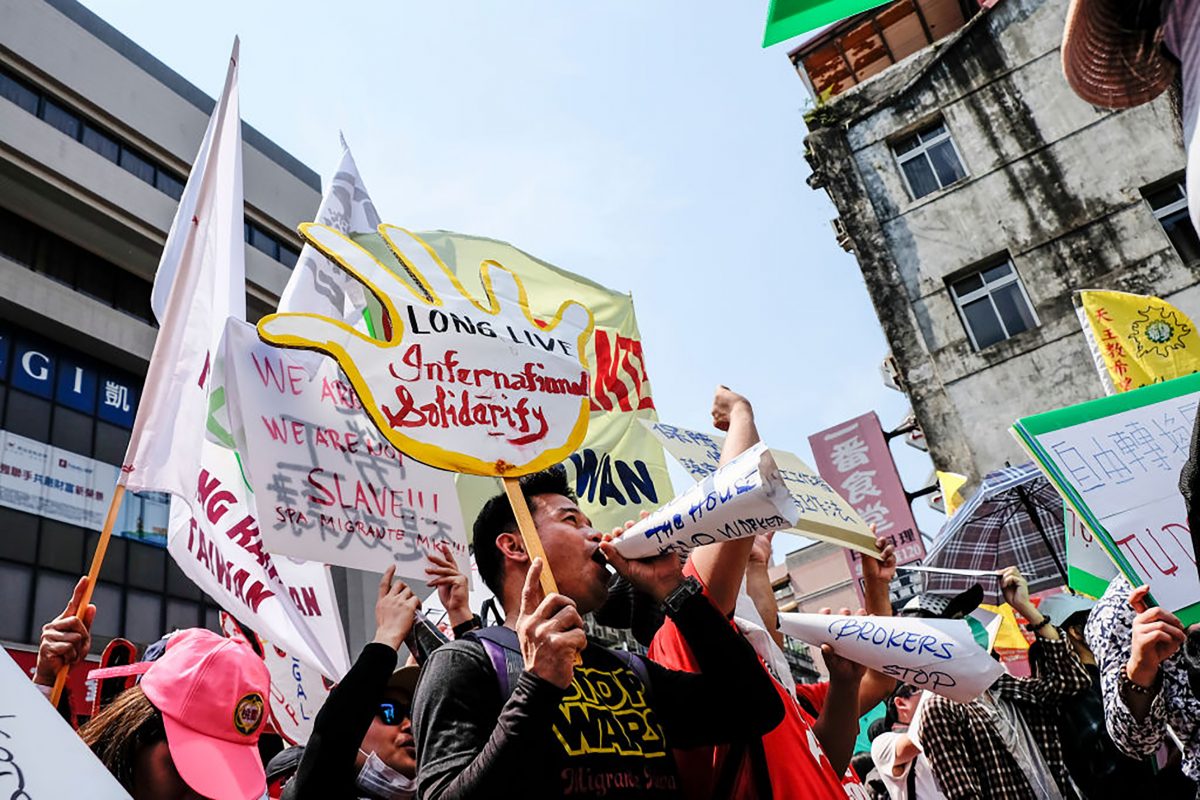
Report into recruitment practices recommends that manpower agency fees be abolished and domestic workers provided labour law protection.
The Taiwanese authorities should abolish all monthly service fees for foreign workers and implement a series of other reforms in order to significantly improve conditions for foreign workers in the country, FairSquare said today in a 102-page report into recruitment practices in Taiwan and the Philippines.
FairSquare Projects is a UK-based non-profit human rights organization with a focus on migrant workers’ rights issues. The report, which examined how workers from the Philippines are recruited for work in Taiwan, was part of the Five Corridors Project, which has been seeking to provide guidance on what states can do to ensure fair and ethical recruitment, in line with UN standards. Taiwan and the Philippines were two of the nine countries under study.
In relation to Taiwan, FairSquare also recommended that the authorities immediately bring domestic workers and caregivers under the protection of labour law, and that they bring the country’s distant water fishing sector under the regulatory authority of the Ministry of Labour and grant them the same protections as other foreign workers. The report commended Taiwan’s efforts in a range of areas, including its impressive legal and regulatory framework, its provision of grievance mechanisms to foreign workers, and noted some positive developments on job mobility despite legal restrictions that continue to tie workers to their employers.
“Taiwan has the capacity and the know-how to ensure that workers brought into the country are recruited ethically and treated fairly on arrival. That so many foreign workers continue to fall through the cracks and into exploitation and abuse should be of serious concern to a progressive rights-respecting state that could be a leader on this critical issue,” said Nicholas McGeehan, FairSquare’s co-director.
Almost all of the workers interviewed in the course of this project had paid significant sums of money to secure jobs in Taiwan, with the exception being electronics workers employed by firms following strict “employer pays” recruitment fee policies. Every year, the recruitment sector in Taiwan earns approximately US $484 million in fully legal monthly service fees from its foreign workers, but our research found that many of these recruitment agents appear to primarily serve the interests of Taiwanese employers, to the detriment of the foreign workers whom they are also supposed to represent. The report recommends that employers pay all the costs associated with recruitment, including all monthly service fees currently paid by foreign workers, in line with international standards on recruitment fees and the “employer pays principle”.
It is clear from research that many foreign workers in Taiwan have positive experiences. One Filipino migrant worker interviewed for the project that she had bought a rice mill and a shop in the Philippines with the money she had earned working in Taiwanese factories. Positive worker outcomes are most likely in Taiwan’s electronics sector, where image-sensitive international companies adhere to codes of conduct, which include the ‘employer pays’ principle on recruitment fees, and which also apply to their suppliers, but serious concerns remain in that sector too. In June this year, it emerged that some high-profile electronics companies in Taiwan have responded to the Covid-19 pandemic by forbidding migrant workers from leaving their company-provided accommodation, except to go to work.
In some cases, local government officials issued orders that placed heavier restrictions on migrant workers’ freedom of movement than for the general population. These restrictions were not mandated by central health authorities to control COVID but were arbitrarily imposed by local officials and stigmatised migrant workers as disease carriers. These measures came under heavy criticisms by Taiwan’s labour and human rights civil society and are the subject of an investigation by the government’s ombudsperson body, the Control Yuan. Taiwanese labour rights group Serve the People Association conducted a survey that suggested that in the latest Covid outbreak to affect Taiwan in 2021, as many as 60% of migrant workers have been forbidden from leaving their accommodation in their free time. “Discrimination of migrant workers in Taiwan is systemic, but the pandemic has made it a lot worse,” said a representative of Serve The People.
Exploitative or illegal working conditions
Many workers and numerous experts described exploitative or illegal working conditions, and some – particularly those in the country’s distant water fishing sector – spoke of abuses that indicate serious gaps in protection for foreign workers. “There are captains who turn into devils when they don’t get what they want,” one Filipino fisherman said. One 39-year old domestic worker recounted how overwork and verbal abuse led her to consider jumping out of a window to escape from her Taiwanese employers. She was able to transfer employers but she still spends most of her salary repaying debts, including the 100,000 Pesos (US $2,085) she paid to get her job in Taiwan.
Taiwan also allows its courts to enforce the repayment of loans that Filipino workers take out in the Philippines to secure jobs in Taiwan. The Taiwanese Legal Aid Foundation (TLAF) has represented hundreds of workers who have challenged Taiwanese court orders sought by Taiwanese lending agencies, who effectively buy workers’ debt from Philippines-based lending agencies and use court orders to enforce deductions from workers’ salaries.
The report’s findings and recommendations are based on 69 interviews with a wide range of stakeholders and experts either remotely or in person in Taiwan, including migrant workers, NGOs working on migrant workers’ rights, trade union representatives, academics, think-tanks, journalists, lawyers, recruitment agencies, employers and representatives of intergovernmental organisations such as the ILO and the IOM. Taiwan’s Ministry of Labour provided important insight and information at various stages throughout the project, both in person and in writing.
A full copy of the report is available at the dedicated Five Corridors Project website.


